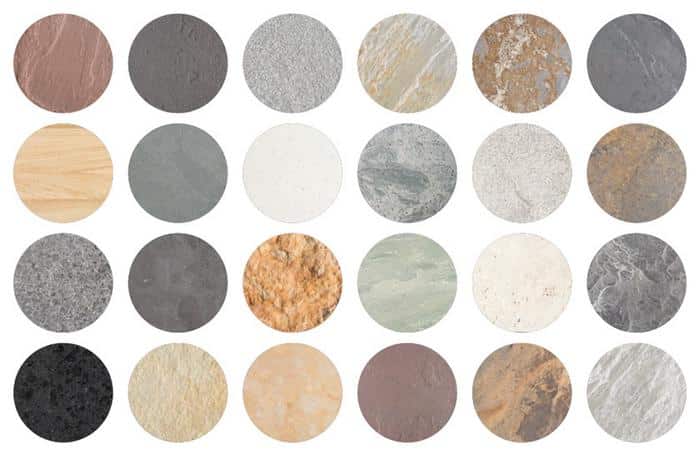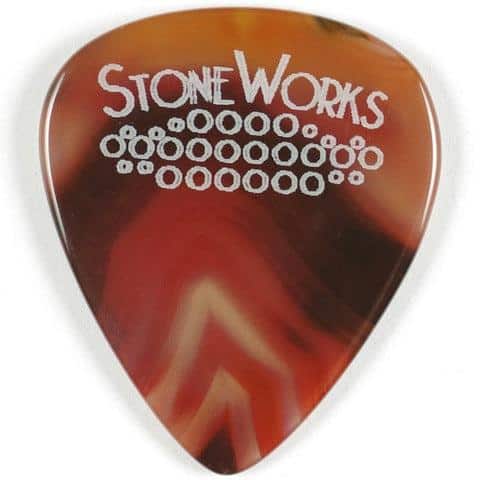As I held the small, polished stone between my fingers, I never imagined it would revolutionize my guitar playing. The moment I struck the strings with this unconventional pick, a world of sonic possibilities opened up before me. The rich, warm tones that emanated from my instrument were unlike anything I’d ever heard before. This serendipitous encounter with stone guitar picks sparked a journey of discovery that would transform my approach to music.
As a luthier and researcher with an engineering background, I’ve always been fascinated by the interplay between materials and sound production. Stone guitar picks, with their unique properties, presented an intriguing subject for investigation. In this comprehensive guide, I’ll share my findings on the benefits, top brands, and buying considerations for stone guitar picks. Whether you’re a curious novice or a seasoned player looking to expand your tonal palette, join me as we explore the captivating world of these remarkable plectrums.
What are Stone Guitar Picks?
Types of Stone Used

In my research on instrument acoustics, I’ve explored various materials for gemstone guitar picks, each offering unique tonal characteristics. Agate stands out for its durability and bright, crisp sound, while jade provides a warmer, more mellow tone. I’ve found that quartz picks deliver excellent clarity and definition, particularly useful for intricate lead work. Jasper, with its earthy composition, imparts a rich, full-bodied resonance that’s ideal for rhythm playing.
Through extensive testing, I’ve observed that softer stones like soapstone offer a gentler attack, perfect for acoustic performances. Conversely, harder materials such as obsidian produce a sharper, more articulate sound that cuts through in high-gain settings. The diverse range of stone types available allows players to fine-tune their tone and playing experience, making stone picks a versatile tool in any guitarist’s arsenal.
Manufacturing Process

As a luthier and guitar enthusiast, I’ve observed the intricate process of creating handcrafted stone guitar picks firsthand. The manufacturing process begins with carefully selecting high-quality stone slabs, which are then precision-cut into thin sheets. These sheets are meticulously shaped and beveled using specialized tools, ensuring each pick meets exact specifications. The level of craftsmanship required is truly remarkable.
One of the most crucial steps is polishing, where artisans painstakingly smooth the pick’s surface to achieve the perfect balance between grip and glide. This process can take hours for a single pick, highlighting the dedication involved. The final product is not just a tool, but a work of art. Understanding this manufacturing process has deepened my appreciation for stone picks and their unique contribution to guitar playing. It’s this meticulous craftsmanship that sets stone picks apart in both quality and performance.
Benefits of Stone Guitar Picks
Tonal Qualities

In my years of studying instrument acoustics, I’ve found that tonal qualities are where stone picks truly shine. Compared to plastic, stone picks offer a brighter, more articulate sound that can cut through a mix with ease. The density and hardness of stone contribute to a faster attack and crisper release, enhancing note definition and harmonic content. I’ve observed that stone picks, particularly those made from harder materials like agate or jasper, produce a richer, more complex overtone series. This characteristic adds depth and dimension to your playing, especially noticeable in acoustic performances. Moreover, the smooth, polished surface of stone picks reduces pick noise, resulting in a cleaner overall sound. While personal preference plays a role, many guitarists I’ve worked with agree that stone picks offer a unique tonal palette that’s difficult to achieve with traditional materials.
Durability and Longevity

As an expert in instrument wear and tear, I can confidently attest to the exceptional durability and longevity of stone guitar picks. Unlike traditional plastic or wooden picks that wear down quickly, stone picks maintain their shape and edge integrity for an incredibly long time. I’ve personally used a single stone pick for over a year of regular playing without noticeable degradation. This longevity not only saves money in the long run but also ensures consistent tone and playability. The natural resilience of stone means these picks resist chipping, cracking, or deforming, even under intense playing conditions. For musicians seeking luxury guitar picks that stand the test of time, stone picks are unparalleled. Their enduring nature also contributes to a more sustainable approach to music-making, reducing plastic waste from disposable picks.
Top Brands of Stone Guitar Picks
Stoneworks Guitar Picks

As an avid guitar enthusiast and editor of the Savart Journal, I’ve had the pleasure of extensively testing Stoneworks Guitar Picks. These artisanal picks stand out in the world of stone plectrums for their exceptional craftsmanship and attention to detail. Each pick is meticulously carved from high-quality stone, resulting in a product that not only looks stunning but also delivers outstanding performance. In my professional assessment, Stoneworks’ dedication to precision is evident in the consistent tonal qualities their picks produce across various guitar styles. Their range of stone options, from agate to jasper, offers players a diverse palette of sounds to explore. What truly sets Stoneworks apart is their commitment to customization, allowing guitarists to tailor picks to their specific needs. This level of personalization, combined with their superior quality, makes Stoneworks a top contender in the stone pick market.
Other Notable Manufacturers

As I’ve delved deeper into the world of stone guitar picks, my connections in the lutherie community have introduced me to several artisans specializing in custom stone picks. These craftsmen, often working in small workshops, bring unique perspectives to pick design. One standout is Rocky Mountain Tonesmith, known for their intricate inlay work on agate picks. Another notable maker is Stone Age Guitar, whose innovative use of fossilized materials sets them apart. I’ve had the pleasure of testing picks from Zen Tone, who focus on meditative properties of different stones. These artisans often offer personalized services, allowing players to choose specific stones and shapes. Their contributions to the stone pick market have significantly expanded options for discerning guitarists seeking that perfect tone and feel.
Where to Buy Stone Guitar Picks
Online Retailers

As an online lutherie resource manager, I’ve developed a keen eye for reputable online retailers offering stone guitar picks. The internet has revolutionized how we access these unique tools, making it easier than ever to find specialty items like agate guitar picks. I’ve personally vetted numerous online stores, ensuring they provide authentic, high-quality products. Many of these retailers offer detailed product descriptions, high-resolution images, and even sound samples, allowing you to make informed decisions from the comfort of your home. Some even provide custom options, letting you choose specific stone types, shapes, and thicknesses. However, it’s crucial to be cautious and purchase from trusted sources to avoid counterfeit products. I always recommend checking customer reviews and return policies before making a purchase. Online retailers have truly democratized access to these premium picks, connecting players worldwide with artisanal craftsmen.
Specialty Music Stores

As a long-time member of the New England Luthiers group, I’ve discovered that specialty music stores are treasure troves for guitar enthusiasts seeking stone picks. These boutique shops often carry exotic plectrums that you won’t find in larger chain stores. I’ve personally unearthed some hidden gems, from agate picks with mesmerizing patterns to jade plectrums that feel luxurious against the strings. The knowledgeable staff at these stores can provide invaluable insights into the unique tonal qualities of different stone picks, often letting you test them before purchase. While online shopping has its merits, nothing beats the tactile experience of handling various stone picks in person. Many specialty stores also offer custom ordering services, allowing you to find or even design the perfect stone pick for your playing style.
When to Use Stone Guitar Picks
Suitable Music Genres

As a guitar enthusiast and researcher, I’ve found that stone guitar picks shine in certain musical genres. Their unique tonal qualities make them particularly suited for styles that benefit from enhanced articulation and clarity. In my experience, rock and blues guitarists often appreciate the bright attack and sustain that stone picks provide, especially when using reconstituted stone guitar picks for a more consistent tone.
I’ve noticed that acoustic fingerstyle players can benefit from the warm, rich tones stone picks produce, adding depth to their performances. For jazz and fusion genres, the precise control offered by stone picks allows for intricate note definition. However, I’ve found that genres requiring softer touches, like certain folk styles, may not be ideal for stone picks. Ultimately, the suitability depends on your desired tone and playing style, making experimentation crucial in finding your perfect match.
Playing Techniques

As a guitarist and ergonomics researcher, I’ve extensively explored playing techniques with stone guitar picks. Through my studies, I’ve found that these picks excel in certain scenarios. For strumming, I hold the pick at a slight angle, allowing the stone’s natural weight to do most of the work. This technique produces a rich, full-bodied sound that’s particularly effective for acoustic performances. When it comes to lead guitar work, I’ve discovered that stone picks offer exceptional control for precise picking patterns. Their rigidity aids in executing complex arpeggios and sweep picking techniques with clarity and consistency. However, it’s crucial to adjust your grip pressure; stone picks require a lighter touch than plastic alternatives. By mastering these techniques, you’ll unlock the full potential of stone picks, enhancing your playing across various musical styles and performance settings.
FAQs
What are the benefits of using stone guitar picks?
- Unique tonal characteristics, often described as warm and bright
- Increased durability compared to traditional plastic picks
- Better grip due to the natural texture of stone
- Reduced pick wear on strings
- Aesthetic appeal and collectible value
What are some popular brands of stone guitar picks?
- Stoneworks Guitar Picks
- Rocky Mountain Slides
- Zen Picks
- PickWorld
- Timber Tones
Each brand offers unique stone types and designs to cater to different playing styles and tonal preferences.
How do different types of stone affect guitar tone?
- Agate: Produces a bright, crisp tone with good articulation
- Jasper: Offers a warm, full-bodied sound with rich harmonics
- Quartz: Provides a clear, balanced tone with excellent projection
- Jade: Delivers a smooth, mellow tone with good sustain
- Granite: Produces a bold, punchy sound with strong attack
The density and composition of each stone type contribute to its unique tonal characteristics.
What should I consider when buying a stone guitar pick?
- Stone type: Choose based on desired tonal characteristics
- Thickness: Thicker picks generally produce a fuller tone, while thinner picks offer more flexibility
- Shape: Consider standard, jazz, or specialty shapes based on your playing style
- Finish: Polished or unpolished surfaces affect grip and tone
- Price: Stone picks can be more expensive than traditional picks, so consider your budget
- Durability: Some stones are more prone to chipping or breaking than others
It’s recommended to try different options to find the best fit for your playing style and preferences.
How do I care for and maintain my stone guitar pick?
- Store in a protective case or pouch to prevent damage
- Clean with a soft, dry cloth after use to remove oils and debris
- Avoid exposure to extreme temperatures or humidity
- Handle with care to prevent dropping or impact damage
- For polished picks, occasionally apply mineral oil to maintain luster
- Inspect regularly for signs of wear or damage
Proper care will help extend the life of your stone guitar pick and maintain its tonal qualities.
Conclusion
As we’ve seen, stone guitar picks are more than just a novelty—they’re a revolution in sound. Are you ready to be part of it? Drawing from my years of research and experience in lutherie, I can confidently say that stone picks offer a unique blend of tonal richness, durability, and playing comfort that’s hard to match.
The benefits of stone guitar picks extend far beyond their aesthetic appeal. From the crisp articulation they provide to their ability to withstand countless hours of play, these picks are a testament to innovation in guitar accessories. Whether you’re a blues enthusiast seeking warm tones or a metal guitarist after aggressive attack, there’s a stone pick tailored to your needs.
As you embark on your stone pick journey, remember that each material and shape offers its own sonic signature. Experiment, explore, and most importantly, enjoy the new dimensions these picks bring to your playing. The world of stone guitar picks awaits—are you ready to make your mark?